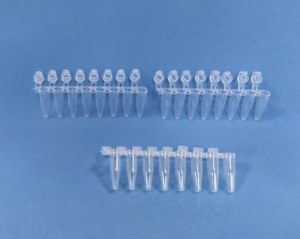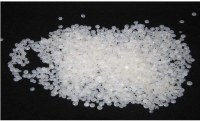PCR tubes, also known as polymerase chain reaction tubes, are essential tools in modern molecular biology research. These small, cylindrical tubes are made from plastic and are designed specifically for the amplification of DNA samples. By subjecting DNA samples to cycles of heating and cooling, researchers can produce millions of copies of a specific DNA segment. PCR strip tubes are commonly used in fields such as genetics, forensics, and medical research. These PCR reaction tubes have revolutionized the way that we study and understand DNA, allowing us to explore new areas of research and to make incredible advancements in science and medicine. As a professional PCR strip tubes manufacture, please feel free to contact us for the PCR tubes price.
Types of PCR Tubes
8-Strip PCR Tubes, Individual Caps
8-Strip PCR Tubes, individual Caps connected with the tubes, 200ul, both Clear and White are available
8-Strip PCR Tubes, Flat Strip Caps
8-Strip PCR Tubes, With Flat Strip Caps, 200ul, both Clear and White are available
PCR Single Tube With Cap, Clear
PCR Single Tune with Cap, Clear, 100ul and 200ul are both available
What Tubes Are Used for PCR?
Polymerase chain reaction (PCR) is an essential laboratory technique used in molecular biology to amplify or copy a specific DNA sequence. This technique has revolutionized many fields, including medicine, genetics, forensics, and more. The success of PCR depends on the selection of the right tubes, enzymes, reagents, and the optimization of reaction conditions.
There are various types of PCR tubes available on the market, including standard PCR tubes, thin-walled PCR tubes, PCR strip tubes, and plate-based PCR tubes. The choice of PCR tubes with caps depend on the application, sample type, volume, automation, and compatibility with the thermocycler. Generally, low profile PCR tubes should be made of high-quality, purified, and heat-resistant plastics that can withstand rapid heating and cooling without distortion or contamination.
The most common PCR tubes used are the thin-walled PCR tubes made of polypropylene. These tubes have a thin wall that allows fast and efficient heat transfer in and out of the tube. Thin walled PCR tubes are available in various sizes, shapes, and colors, to suit different applications and preferences. The flat cap of the PCR tube helps to reduce evaporation and contamination, and can be labeled with different colors and writing for easy identification.
Another type of PCR tube is the strip tube. These tubes are arranged in a strip that can be cut apart after amplification. They are useful for high-throughput applications, where multiple samples can be tested simultaneously, and are compatible with automation systems. Some types of PCR strip tubes have individual caps, while others have a common cap that covers all the tubes.
Plate-based PCR tubes are another popular option for PCR. These tubes are arranged in a 96-well or 384-well format, depending on the instrument used. They are used for high-throughput screening or genotyping, and are compatible with robotic systems. The plate-based PCR tubes are usually made of clear polypropylene, which allows for easy visualization of the reaction and facilitates analysis.
In conclusion, the choice of PCR tube depends on the specific requirements of the application, including volume, type of sample, compatibility, automation, and budget. However, regardless of the type of tube used, it is essential to ensure that the tubes are of high quality, free of contaminants, and suitable for the thermocycler being used. The correct selection of PCR tubes is crucial for obtaining accurate and reproducible results in molecular biology research and clinical diagnostics.
What is the purpose of PCR tubes?
PCR tubes, also known as polymerase chain reaction tubes, are plastic tubes used in molecular biology to amplify DNA samples. These PCR reaction tubes are specially designed to withstand high temperatures during the PCR process, where DNA is replicated through cycles of heating and cooling.
The purpose of PCR tubes is to provide a sterile environment for the reaction to occur and to prevent contamination. They are available in different sizes and shapes, depending on the volume and type of sample to be amplified. PCR tubes are also compatible with PCR machines, which use thermal cycling to replicate DNA.
PCR tubes are essential in various applications, including cloning, gene expression analysis, and disease diagnosis. They are widely used in research laboratories, pharmaceutical companies, and medical clinics. PCR technology has revolutionized the field of molecular biology, and PCR tubes are an integral part of this advancement.
Location : Building 3, No. 12, Chunchao Road, Chang'an Town, Haining City, Zhejiang Province, 314423 Zhejiang ,
Contact : med yikang, 86 0573 87979518







